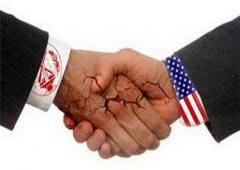An unhappy 60th birthday: The CIA coup of 1953 still resonates in Iran. Operation Ajax remembered
Mohammed Mossadeq under arrest in 1953.To disseminate [views of Iranian Prime Minister Mohammed Mossadeq as a fanatic], the British press attaché in Tehran sent his counterpart in Washington "a steady supply of suitable poison too venomous for the BBC." The Washington attaché reported American columnists made "good use of this poison." He boasted he even helped them write some their pieces on Iran. Drew Pearson—the venerable dean of American journalism and lead columnist for the Washington Post—circulated a completely fabricated story about how F astemi, Mossadeq’s right hand, had multiple convictions of embezzlement and jury tampering. […] Stewart Alsop and his brother Joseph—both leading columnists for The New York Herald—warned that unless the United States took a firm stand, "all the little Musaddiqs would be tempted to cause trouble."—Ervand Abrahamian in The Coup: 1953, The CIA, and the Roots of Modern U.S.-Iranian Relations, p. 100
astemi, Mossadeq’s right hand, had multiple convictions of embezzlement and jury tampering. […] Stewart Alsop and his brother Joseph—both leading columnists for The New York Herald—warned that unless the United States took a firm stand, "all the little Musaddiqs would be tempted to cause trouble."—Ervand Abrahamian in The Coup: 1953, The CIA, and the Roots of Modern U.S.-Iranian Relations, p. 100
••• •••
It would make a great movie. But a tad different than Argo.
Straightforward plot. Characters bigger than life. Stunning success against difficult odds after initial failure.
At the behest of two of the most powerful brothers in U.S. history, the aristocratic grandson of a famous president engineers a coup d’etat against a secular, democratically minded reformist leader and replaces him with a pro-Nazi prime minister overseen by a spoiled, craven monarch who proceeds to keep democracy at bay, the oil flowing and the torture chambers full for the next quarter century, after which he is ousted only to be replaced by a theocratic regime. From this flows the most devastating example of blowback America has ever felt. Blowback that continues today. Blowback that has contributed to internal wrangling within three U.S. administrations between those who choose not to make war beyond sanctions and assassinations and those who want to go full out.
Unfortunately, all this is not a script being pitched to a Hollywood studio. It is history. Operation Ajax. Planning and control: CIA. Partner: MI-6. Target: Iran. The date: Aug. 19, 1953. Objective: Its oil, its near-Soviet locale and overthrow of its democratically elected prime minister, Mohammad Mossadeq, to be replaced by a weak-willed wastrel, the hereditary monarch, Mohammad Reza Shah Pahlavi.
No short commentary can possibly do justice to any complex subject, and the Iranian coup and its fall-out is no exception. Condensing inevitably damages nuance. Interpretation across cultural divides cannot help but get many little matters and some essential ones wrong. Despite these pitfalls, however, it’s important for Americans to understand how the policies conducted before 85 percent of the U.S. population and 95 percent of the Iranian population were born still has a serious impact and creates perils today.
After all, it’s a rare month that goes by without saber-rattling from some high-up U.S. politicians about the need to use U.S. firepower to "fix" Iran. Tactics aside, there is bipartisan consensus in the heights of U.S. foreign policy circles for curtailing Iran, particularly what is usually labeled its "nuclear ambitions." While conventional war, the bomb-bomb-bomb Iran approach has been so far avoided because that still remains a last resort of the bipartisan consensus, other attacks on Iran have continued, including by means of Stuxnet, the cyber-weapon built by the National Security Agency together with CIA and Israeli intelligence and used to temporarily cripple the uranium enrichment operations in Natanz, Iran. There are, in addition, assassinations of Iranian nuclear scientists by the Iranian terrorist organization Mojahedin-e-Khalq assisted with funding and training assistance of America’s ally Israel.
by Meteor Blades , Daily KOS

